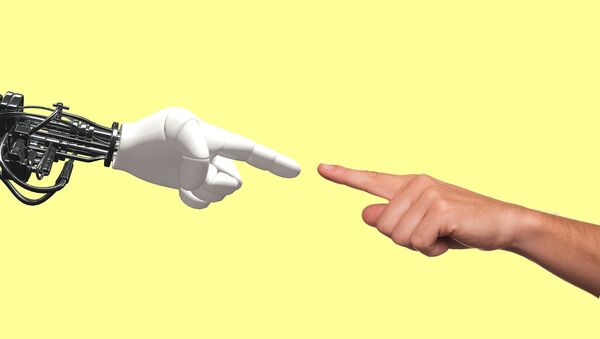"The sensationalist coverage these stories receive isn't very helpful and obscures the main issues," author Chris Middleton told Sputnik.
"We're not talking about C-3P0 sitting at your desk, we're talking about smart devices, industrial machines, drones, autonomous vehicles, plus software that automates technology."
The Rise of the Machines #AI #ArtificialIntelligence #Robots #MachineLearning #Robot #Gif:@Sanemavcil pic.twitter.com/XbANcpMhh3
— 24k Media (@24kMedia) June 9, 2017
Accountancy firm PwC analysed 200,000 jobs across 29 countries and suggests the first wave of job losses will begin in the early 2020s.
"When you look at financial services, a lot of jobs are relatively routine jobs such as data analysis," said PwC chief economist John Hawksworth who suggests the closure of bank branches is indicative of the current situation. Around six and eight percent of positions in the financial sector could be lost because "a lot of jobs are relatively routine jobs such as data analysis," he said.
#AI, #robots and other forms of #automation could contribute $15 trillion to global GDP by 2030. But how many jobs could these technologies create or displace? https://t.co/siwmL9kpRl pic.twitter.com/jNd9QVZ7ik
— PwC UK (@PwC_UK) February 6, 2018
However the potential for job losses in the financial sector is "already a massive problem," according to Chris Middleton.
"The entire banking sector is a giant algorithm that employs human beings — not the other way round. It's a no-brainer the sector will be the first to automate on mass", Middleton told Sputnik.
"Branch employees talk customers through a series of slides and they're not allowed to depart from those scripts or be distracted by the customer. It's already a compliance system in which the computer says "yes" or "no" not the human."
”Perhaps this is unsurprising. After all, the banking and finance industry is principally built on processing information, and some of its key operations, like passbook updating or cash deposit, are already highly digitised.” #AI #robotics #banking https://t.co/rTFOyg3SnL
— Annika Poutiainen (@annikapoutiaine) February 6, 2018
'Chicken Feed'
A British government report published in October 2017 estimated that Artificial Intelligence (AI) could add USD $814 billion to the UK economy by 2035.
"Our vision is for the UK to become the best place in the world for business developing and deploying AI to start, grow and thrive, to realise the benefits the technology offers," the report 'Growing the artificial intelligence industry in the UK' suggests.
However the funding allocated by the government to achieve this is "chicken feed" according to Chris Middleton. "The UK government has identified robotics as among eight great technologies critical to the future of Britain's economic health and success, yet the government is investing "chicken feed" to grow the sector", he told Sputnik.
"Britain is investing around 200 and 300 million in robotics and automated systems meanwhile Japan by comparison is investing 161 billion. Britain has identified technology as critical for UK prosperity yet nothing it being done to encourage it, instead the government hopes the market will do it itself," Middleton said.
According to the government report, "AI offers massive gains in efficiency and performance to most or all industry sectors."
"Our vision is for the UK to become the best place in the world for business developing and deploying Ai to start, grow and thrive, to realise all the benefits the technology offers," the report states.
READ MORE: UK's First Driverless Shuttlebus Makes Next-Gen History on London Streets
Middleton agrees the UK has the potential to be at the forefront of robotics and AI, but is concerned the government isn't investing enough money into the sector.
"We've got the experts but the UK isn't investing enough money", Middleton told Sputnik. "We have 19th century thinkers in a 21st century world trying to apply 19th century industrial thinking to the 21st century sector without understanding anything about it."
The @UniofOxford will showcase its artificial intelligence (#AI) #research with a one-day expo on 27 March 2018: https://t.co/4m7NAnxpbu @WolfsonCollege @CompSciOxford @oxengsci @OxManInst @oxfordrobots @oxbotica pic.twitter.com/Y2CKR4DM2t
— Oxford University (@UniofOxford) February 5, 2018
Great to hear @theresa_may cite our #gov #ai readiness index at @davos
— Oxford Insights (@oxfordinsights) January 25, 2018
"Already, the UK is recognised as first in the world for our preparedness to bring AI into public service delivery"
Now let's see the UK capitalise on that. pic.twitter.com/ZnfIm56kdj
While the UK continues to negotiate how it leaves the European Union, Chris Middleton remains concerned where the money will come from once Brexit becomes a reality.
"Around 85 percent of the funding for AI, robotics and autonomous systems comes directly from the European Union and I'm not aware of any strategy in place to replace that funding or know where it will come from when we leave Europe," Middleton told Sputnik.
READ MORE: UK's Silicon Valley Given Thumbs Up But Brexit Will 'Slow it Down'
The views expressed in this article are those of the interviewee and do not necessarily reflect the official position of Sputnik.

